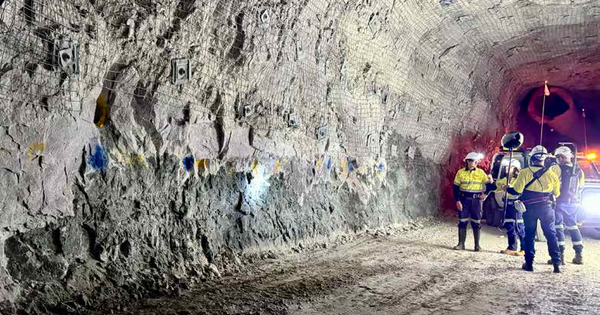Australia’s up-and-coming lithium producer Liontown Resources posted a net loss of A$60.5 million for the fiscal year ending June 30, 2023, as the company continues its transition from explorer to producer at its flagship Kathleen Valley project in Western Australia.
The annual loss widened by 44% compared to the previous year’s A$42 million deficit, reflecting the substantial investments required to bring Kathleen Valley online. Despite the red ink, company executives maintain the p
...
Australia’s up-and-coming lithium producer Liontown Resources posted a net loss of A$60.5 million for the fiscal year ending June 30, 2023, as the company continues its transition from explorer to producer at its flagship Kathleen Valley project in Western Australia.
The annual loss widened by 44% compared to the previous year’s A$42 million deficit, reflecting the substantial investments required to bring Kathleen Valley online. Despite the red ink, company executives maintain the project remains on track to begin production in mid-2024, positioning Liontown to capitalize on the growing global demand for battery minerals.
Kathleen Valley, located about 680 kilometers northeast of Perth, represents one of Australia’s most significant undeveloped hard-rock lithium deposits. The project has attracted attention from major industry players, including electric vehicle manufacturer Tesla, which signed an offtake agreement with Liontown last year.
“While our financial results reflect the expected costs associated with development, the fundamentals driving our business have never been stronger,” said Liontown CEO Tony Ottaviano. “The global transition to electric vehicles and renewable energy storage continues to accelerate, underpinning long-term demand for high-quality lithium supplies from stable jurisdictions like Australia.”
The company’s financial report highlighted that cash expenditures on the Kathleen Valley project reached A$471 million during the reporting period, with overall project completion now standing at approximately 70%. The total capital expenditure for the development is estimated at A$895 million, with first production of spodumene concentrate scheduled for the second quarter of 2024.
Industry analysts note that Liontown’s development timeline coincides with projections of tightening lithium supplies in the mid-decade. After experiencing price volatility throughout 2022 and 2023, many market observers forecast renewed price strength as manufacturing capacity for electric vehicles and battery storage systems continues to expand globally.
“Companies like Liontown that can successfully bring new production online in the next 12-24 months will be well-positioned to meet this growing demand,” said Michael Anderson, resources analyst at Wilson Stockbroking. “The challenge is navigating the capital-intensive development phase while maintaining financial flexibility.”
The company’s balance sheet showed cash reserves of A$385 million as of June 30, bolstered by a A$365 million equity raising completed in December 2022. Additionally, Liontown has access to a A$300 million debt facility to support the final stages of construction and commissioning at Kathleen Valley.
Beyond the flagship project, Liontown has continued exploration activities at its Buldania lithium project, also located in Western Australia. The company reported encouraging drill results during the year, suggesting potential for resource expansion and a possible second development opportunity in its portfolio.
The global context for Liontown’s development efforts remains complex. While lithium carbonate prices retreated from record highs set in late 2022, the medium to long-term outlook remains positive. Major automakers continue to announce ambitious electric vehicle production targets, with lithium-ion batteries remaining the dominant technology for both transportation and stationary energy storage applications.
Australia has emerged as a critical supplier in the global lithium value chain, with Western Australia hosting several world-class hard-rock deposits. The country’s established mining infrastructure, skilled workforce, and proximity to Asian processing facilities have made it an attractive jurisdiction for lithium development.
Liontown’s progress at Kathleen Valley comes amid increasing competition for capital in the battery minerals sector. Several Australian lithium projects have faced challenges related to cost escalation and construction delays, making Liontown’s ability to execute on schedule particularly significant to investors.
The company also highlighted its sustainability initiatives, including plans to power Kathleen Valley with a hybrid solar and wind generation facility that will provide up to 60% of the project’s energy requirements. This approach aligns with the broader industry trend toward reducing the carbon footprint of battery material production.
Looking ahead, Liontown management indicated that the coming year would be transformative as the company completes construction, begins commissioning activities, and transitions to production. The initial phase at Kathleen Valley is designed to produce approximately 500,000 tonnes of spodumene concentrate annually, with expansion potential to 700,000 tonnes in subsequent years.
“While the development path inevitably includes financial challenges, we remain confident that Kathleen Valley will deliver substantial long-term value for our shareholders,” Ottaviano said. “The project’s tier-one scale, long life, and competitive operating costs position Liontown as an important contributor to the global energy transition.”


